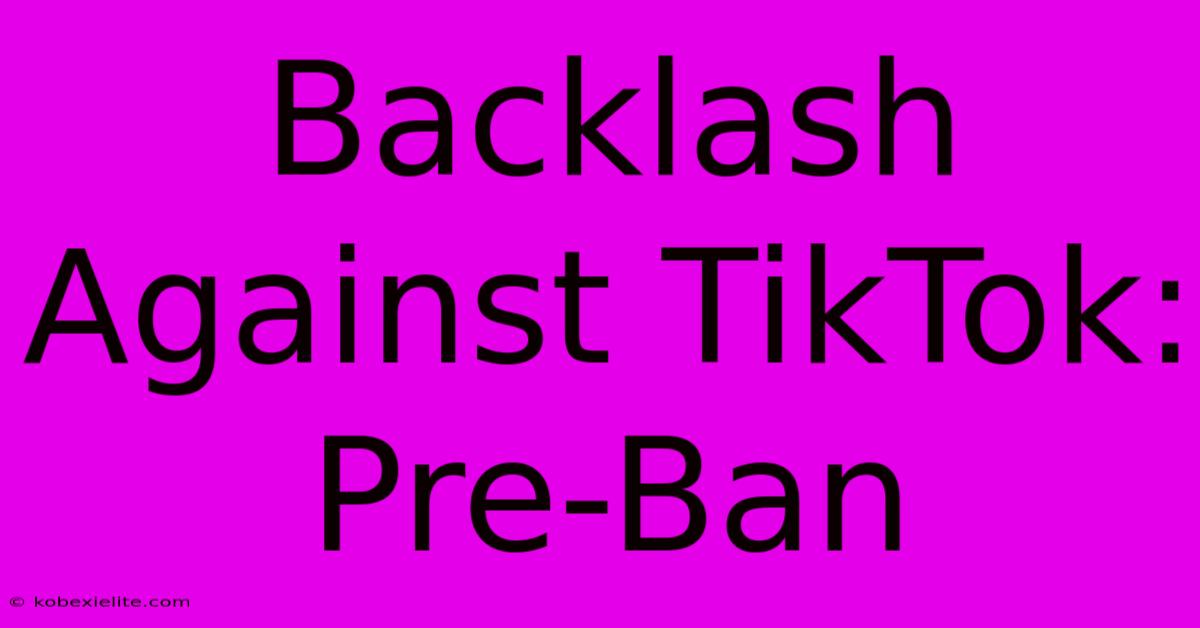Backlash Against TikTok: Pre-Ban

Discover more detailed and exciting information on our website. Click the link below to start your adventure: Visit Best Website mr.cleine.com. Don't miss out!
Table of Contents
Backlash Against TikTok: Pre-Ban Concerns and Criticisms
TikTok's meteoric rise wasn't without significant controversy. Even before bans and restrictions were implemented in various countries, the platform faced a growing wave of backlash stemming from several key concerns. Understanding this pre-ban criticism is crucial to comprehending the ongoing debates surrounding the app's impact.
Data Privacy and Security Concerns: A Central Issue
One of the most significant pre-ban criticisms leveled against TikTok revolved around data privacy and security. Many expressed concerns about the app's parent company, ByteDance, being a Chinese company. This raised questions about the potential for the Chinese government to access user data, potentially compromising sensitive personal information.
Specific Concerns Included:
- Data transfer to China: Fears existed regarding the transfer of user data to servers located in China, bypassing data protection regulations in other countries.
- Algorithmic transparency: The lack of transparency surrounding TikTok's algorithm fueled concerns about how user data was being used to personalize content and potentially manipulate user behavior.
- Access by Chinese government: The potential for the Chinese government to compel ByteDance to hand over user data presented a serious threat to user privacy and national security in many countries.
These concerns were amplified by reports and investigations highlighting the app's data collection practices, sparking widespread debate and calls for increased regulatory scrutiny.
National Security Risks: A Growing Threat
Beyond data privacy, national security risks emerged as a primary driver of the pre-ban backlash. Critics argued that TikTok could be used for:
- Propaganda and disinformation: The platform's algorithm, capable of amplifying certain types of content, raised concerns about its potential to spread misinformation and propaganda.
- Surveillance and espionage: The possibility of TikTok being used to collect sensitive information about government officials, infrastructure, and military personnel presented a significant national security threat.
- Influence operations: Fears of foreign influence through the platform were considerable, leading to concerns about potential interference in elections or other political processes.
These concerns were particularly prominent in countries with strong geopolitical tensions with China.
Content Moderation and Harmful Content: A Persistent Problem
Another key aspect of the pre-ban criticism was TikTok's content moderation policies. While TikTok implemented measures to remove harmful content, concerns remained about:
- Effectiveness of moderation: Critics argued that the platform's moderation systems were insufficient to effectively address the spread of harmful content, including hate speech, violence, and misinformation.
- Consistency of enforcement: The inconsistent application of community guidelines raised questions about the fairness and transparency of the platform's content moderation practices.
- Impact on mental health: The addictive nature of the app and the potential for exposure to harmful content also raised concerns about its impact on users' mental health, especially among young people.
The challenge of effectively moderating a platform with billions of users and a rapidly evolving content landscape presented significant hurdles for TikTok.
The Pre-Ban Landscape: A Summary
The pre-ban backlash against TikTok was multifaceted, stemming from legitimate concerns regarding data privacy, national security, and content moderation. These concerns contributed significantly to the subsequent bans and restrictions imposed on the platform in various countries, highlighting the complexities of regulating powerful social media platforms in the digital age. The debate surrounding TikTok continues, underscoring the need for effective regulations and transparent practices to balance innovation with the protection of user rights and national interests.

Thank you for visiting our website wich cover about Backlash Against TikTok: Pre-Ban. We hope the information provided has been useful to you. Feel free to contact us if you have any questions or need further assistance. See you next time and dont miss to bookmark.
Featured Posts
-
West Indies Restrict Pakistan Seales Triple
Jan 17, 2025
-
Raducanu Fears Open Clash With Murray
Jan 17, 2025
-
Man Utd 3 1 Southampton Full Analysis
Jan 17, 2025
-
David Lynch 78 Twin Peaks Creator Dies
Jan 17, 2025
-
One Of Them Days A Players Review
Jan 17, 2025
